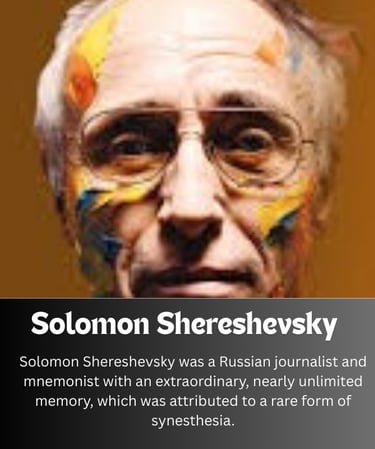Solomon Shereshevsky
The Visionary Engineer with an Eidetic Memory


Solomon Veniaminovich Shereshevsky, a Russian journalist born in the 1880s, possessed a memory that astounded scientists and baffled himself. Unlike other individuals with extraordinary memory who used specific techniques, Shereshevsky's ability was a fundamental part of his being. He could recall virtually everything he ever saw or heard, a gift that would both define his life and become a heavy burden. His story was documented in the classic 1968 case study, "The Mind of a Mnemonist," by neuropsychologist Alexander Luria.
The Accidental Discovery:
Shereshevsky’s phenomenal memory was discovered by chance in the 1920s while he was working as a journalist. His editor, bewildered that he never took notes during meetings, confronted him. Shereshevsky, genuinely surprised by the question, simply explained that he didn't need to—he remembered everything. He then proceeded to recite verbatim the entire meeting's instructions and assignments, down to the smallest detail. This remarkable feat led him to Luria's laboratory, where he became the subject of a 30-year-long study.
Synesthesia: The Key to His Memory
Luria discovered that Shereshevsky's memory was inextricably linked to a rare neurological condition called synesthesia. For him, every stimulus, regardless of the sense it came from, automatically triggered a cascade of reactions in all his other senses. A sound would not just be heard, but also seen as a color, felt as a texture, and even tasted. He saw numbers as distinct personalities: "Take the number 1. This is a proud, well-built man; 2 is a high-spirited woman..." The sound of a word could evoke a vivid image, a specific taste, or a physical sensation.
Solomon Shereshevsky, A Mind with a Perfect Memory
This constant, involuntary sensory overlap acted as a powerful mnemonic system. When he was asked to memorize a list of words, he would simply take a mental walk down a familiar street and place each item at a specific location. Recalling the list was as simple as mentally retracing his steps. This technique, known as the Method of Loci or "memory palace," came to him naturally due to his synesthesia.
The Burden of a Perfect Memory:
While an impeccable memory may seem like a superpower, for Shereshevsky, it was a profound handicap. He had no "forgetting filter"—everything was retained with equal vividness, making it difficult to prioritize information. He struggled with:
Abstract Concepts: Since every word had a literal, sensory association, he couldn't grasp abstract ideas or figurative language. He reportedly had difficulty understanding simple concepts like "nothing."
Recognizing Faces: Because he remembered faces with perfect photographic detail, he would become confused when a person's expression, lighting, or age caused their appearance to change.
Mental Clutter: His mind was constantly filled with an overwhelming amount of information and sensory data. The images, sounds, and sensations would often crowd together and create a jumble of distracting information.
In a desperate attempt to forget, he would write things down on paper and burn them, watching the words disappear in the flames in a desperate attempt to erase them from his mind. He found a measure of relief by becoming a professional mnemonist, performing his memory feats for a living, but eventually, he grew tired of it.
Solomon Shereshevsky's life illuminates a fundamental truth about memory: the ability to forget is just as vital as the ability to remember. His story remains one of the most remarkable and cautionary tales in the history of psychology.
Discover the extraordinary and unique stories.
Inspire
© 2025. All rights reserved.
